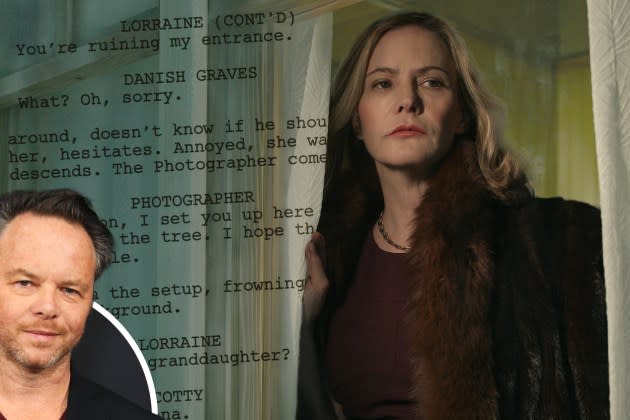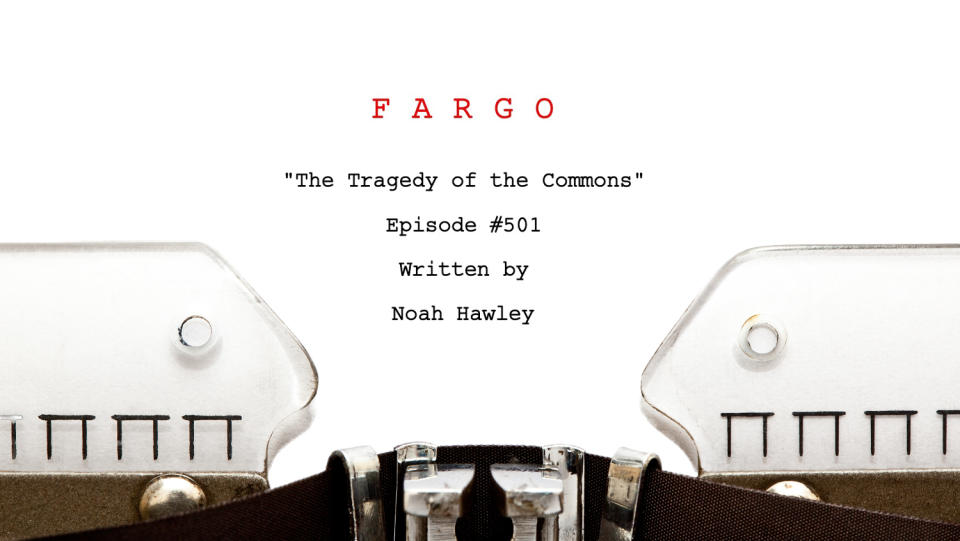It Starts On The Page: Read ‘Fargo’ S5 Premiere Script “The Tragedy Of The Commons” By Noah Hawley

Editor’s note: Deadline’s It Starts on the Page features standout limited or anthology series scripts in 2024 Emmy contention.
Typically a series five seasons in can show signs of wear and tear. However, for Fargo creator Noah Hawley a fifth time was a charm, not just in a stronger homage to the original 1996 multi-Oscar winning movie, but a deconstruction of current day red-state attitudes. For him, Fargo is about the tragedy that occurs when people fail to communicate, and this season centers around the varying definitions of freedom. Not to mention, it features several twists and turns one doesn’t see coming.
More from Deadline
It Starts On The Page: Read 'The Regime' Finale Script "Don't Yet Rejoice" By Will Tracy
TV Talk Podcast: Emmys Limited Series Category Is Anything But Limited This Year & Needs More Slots
Season 5 follows Juno Temple as Dot Lyon, a housewife with a dark past who is mired in warring America, for Episode 1 tees off with a riot that breaks out at a school board meeting which results in the show’s protagonist tasing an officer and heading to the slammer for just a moment. It’s an incident, one of many, which takes Dot’s wimpy rich-brat husband Wayne (David Rysdahl) and her fierce mother-in-law, Lorraine Lyon (Jennifer Jason Leigh) by surprise. Also starring this season are Jon Hamm as a corrupt sheriff, Dave Foley as Lorraine’s loyal, and goofy eye-patch right hand, and Sam Spruell as a kilt-wearing relentless assassin from a medieval time and place.
In introducing the script for Episode 1, “The Tragedy of the Commons,” which Hawley wrote and directed, he discusses the parallels and differences between Fargo‘s fifth season and the Coen brothers movie, his take on Minnesota Nice and the meaning behind the premiere’s title.
In 2022, after four seasons of Fargo, I decided it was finally time to engage directly with Joel and Ethan Coen’s film. I wanted to play a game of telephone with the story of the movie — a husband has his wife kidnapped by two men — and, through this, interrogate the concept of Minnesota Nice. It’s an idea born from the 1996 film, in which the residents of the Coen’s fictional upper Midwest, suffered from a level of passive aggressivity and mandated chipperness so severe it led to explosive violence. And yet, as I looked around in 2022, there was nothing passive about the aggression I saw at school board meetings and town halls around the region. People had stopped pretending to get along. They had turned on civility itself.
If Minnesota Nice was the way the fictional people of Minnesota people put the needs of the many above their own needs, what happened to those communities when me first became the rule of the land? I always said that Fargo was a tragedy with a happy ending where basically decent people, in over their heads against the forces of cynicism and violence, triumphed over villainy. But how can decency prevail when selfishness becomes not just a quality of the villainous, but of everyday life?
So a man has his wife kidnapped. In the Coen’s version the story follows the husband. He is the subject of the story. The wife is the object. First she is whisking. Then she has a bag over her head. Then she is dead.
In my version the wife, Dorothy “Dot” Lyon, is the subject. And the husband in question is not her current man, but the abusive husband she escaped a decade prior. But because television lends itself to multiple points of view, at five times the length of a film, the husband, Sheriff Roy Tillman, could also be a subject of the story. And I could use all ten hours to explore the concept of wifeness itself, both through Dot’s journey and those of the other women in the show — Jennifer Jason Leigh’s Lorraine Lyon and Richa Moorjani’s Indira Olmstead. And through the unpacking of the word Wife, I could in turn play with ideas of masculinity. This is the power of the limited series. Its expansiveness allows storytellers to experiment with characters and themes, not just tell a story with a beginning, middle and end.
The tragedy of the commons, for which the episode is named, is a metaphorical philosophical paradox, in which any common space shared by individuals will ultimately be destroyed because individuals inevitably put their own needs first. For example, if each of us has a cow grazing in a pasture there is balance. The pasture sustains itself and enriches all our lives. But if you decide to graze ten cows or fifty, soon the pasture is stripped bare and thus rendered unusable by all. Fargo has always been a vehicle for me to explore the tension between people who share and people who don’t.
This year it was also a way for me to take a story you know and make it new again. To restage familiar set pieces — two men in masks arrive at a suburban home to kidnap a woman, later a state trooper pulls them over, etc — with unexpected results, so that in your mind you are both remembering a story as it unfolds, and discovering a new story simultaneously.
And so was born Dorothy Lyon, the tiger. Someone who embodied our best qualities — decent, resourceful, creative — someone who refused to surrender to cynicism and despair, who wanted to make her own choices, to share a home with a man she loved, to teach her daughter to be prepared without teaching her to be afraid. Someone who stood up to bullies. And through her, my hope was, the best parts of Minnesota Nice could be restored.
Click below to read the script.
Best of Deadline
'Presumed Innocent' Release Schedule: When Do New Episodes Air?
Hollywood & Media Deaths In 2024: Photo Gallery & Obituaries
2024-25 Awards Season Calendar - Dates For Oscars, Emmys, Grammys, Guilds & More
Sign up for Deadline's Newsletter. For the latest news, follow us on Facebook, Twitter, and Instagram.



